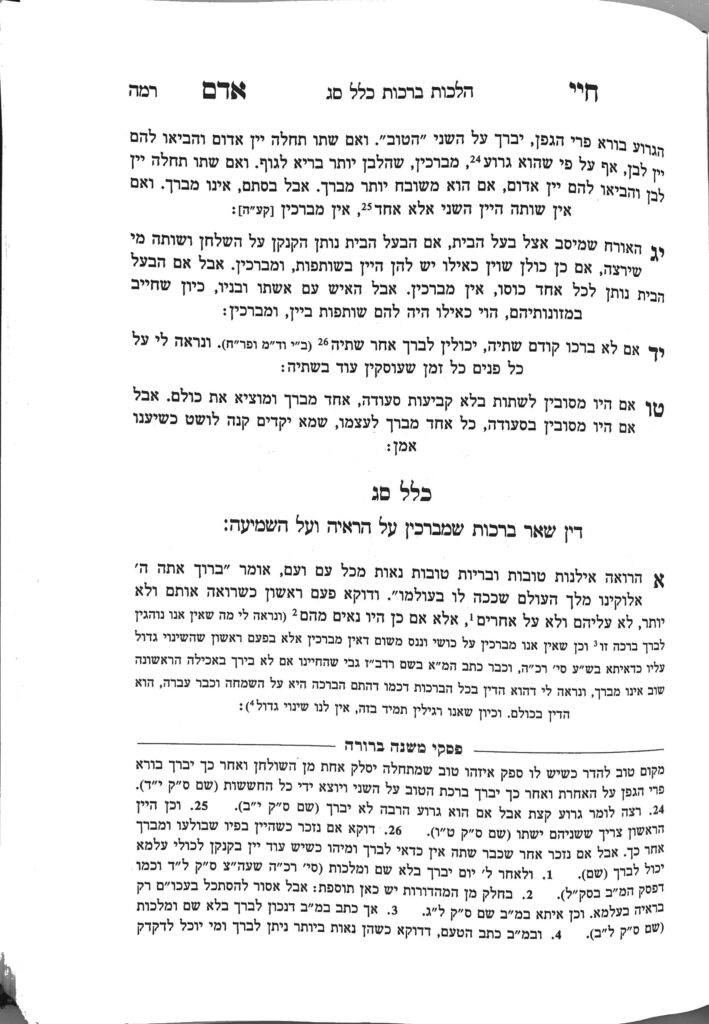We are continuing in siman 12. The Chayei Adam writes that, although red wine has superior flavor over white wine, white wine is healthier for the body, so hatov umeitiv can be made over the white wine. And, since red wine has a superiority over white wine (its flavor), hatov vehametiv can still be recited on the red wine.
If the white wine is both healthier and of superior flavor to the red wine, one should say the hagefen on the white wine and no bracha is made on the red wine.
The Gemara teaches us that the reason red wine is preferred at the Pesach seder is because it is of greater strength and quality than white wines. Nevertheless, the Chayei Adam is of the opinion that white wine is still healthier than red wine. It is also possible that the Chayei Adam held that our red wines are not necessarily better in quality than our white wines.
The Chayei Adam writes that in order to recite hatov vehametiv, both wines must be drunk by more than one person.
In siman 13, the Chayei Adam writes that if a host places wine on the table, and offers anyone who wishes to partake of the wine, the bracha of hatov vehametiv is recited, even if the host himself does not partake of the wine. However, if the host individually pours the wine for each guest, each individual’s wine is independent of the other guests, and hatov vehameitv is not recited.
However, if one is drinking the wine with his wife and children, they always recite hatov vehametiv, because he is responsible for their sustenance.
We see that the Chayei Adam understands that in order to recite hatov vehametiv, the wine must be shared in some way, either due to shared ownership (wife and children) or because the group is considered joined together (guests)..
In siman 14, the Chayei Adam writes that if one forgot to recite hatov vehametiv before drinking their wine, they may recite it after they have begun to drink, as long as they still plan to drink more. Even if they do not plan to drink more, if they realize they forgot the bracha before they swallow the wine in their mouth, they may recite hatov vehametiv after swallowing.
In siman 15, the Chayei Adam discusses whether one person should make the bracha and be motzi everyone else, or if every person should make their own bracha. Generally, we have a concept of b’rov am hadras melech, which would teach us that one person should make the bracha and everyone should answer amen. However, when it comes to eating, we are concerned that if people need to answer amen to someone else’s bracha, they may have food or drink in their mouth at that moment, and cause themselves to choke.
Therefore, the Chayei Adam writes that if the group is only drinking, one person should make the bracha for everyone. If the group is eating as well, every person should make their own bracha. In order to avoid the issue of people choking, each person should recite their bracha silently, so that the others do not need to answer amen.
Summary
- If one has a white wine and red wine in front of them, If the red wine is superior in flavor,the hagefen should be said on the red wine. Hatov umeitiv can be said on the inferior white iwen, because in one way it is superior, as it is healthier. If one drank white wine first, assuming that the red wine has superior flavor, they will subsequently recite hatov vehametiv on it; if it is not superior, they will not recite any bracha on it.
- In order to recite hatov vehametiv, both wines must be drunk by more than one person. The wines must also be considered shared in some way. The Chayei Adam gives two examples, where anyone may partake of it (e.g., guests at a table), and people for whom one is responsible (i.e., wife and children).
- If one forgot to recite hatov vehametiv before drinking their wine, they may recite it after they have begun to drink, as long as they still plan to drink more.
- If they do not plan to drink more, if they remember while the wine is still in their mouth, they may recite it after swallowing.
- If a group is drinking wine, one person recites the bracha and all answer amen. If the group is eating as well, each person should recite the bracha silently to themselves.



